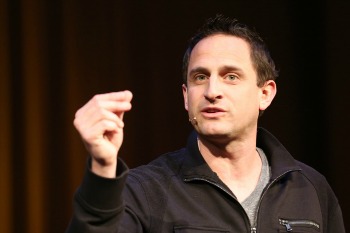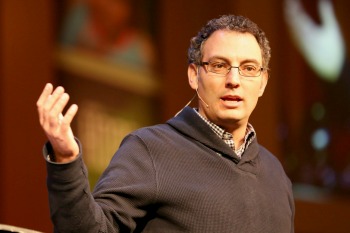Mills, Lyon, Page, Himaya explored the challenges of change at the recent RISK conference.

Brian Mills, teaching pastor at Englewood Baptist Church in Jackson, Tennessee.
“If you ain’t amongst ’em, you ain’t reaching ’em,” Brian Mills, ministries and teaching pastor at Englewood Baptist Church in Jackson, Tenn., told attendees at the KBC’s RISK conference Feb. 24.
Mills, author of “Virtuosity,” was one of four speakers at Louisville’s Highview Baptist Church to address the topic “Change is hard. I’m overwhelmed.”
Statistics show that one in four millennials are unchurched, and although millennials are “scary” to many, they must be reached, Mills said.
Mills presented three ways to reach millennials: 1) Create authentic community, 2) Have a missional movement to invest in and be a part of, and 3) “Get amongst ’em.”
He stressed the importance of getting out of one’s office and being among the people. This is how Jesus did ministry, Mills noted.
Gabe Lyons, founder of Q Ideas and author of “The Next Christians,” described what the millennial church looks like.
Establishing that millennials are college kids and those in their 20s and early 30s, Lyons observed, “Millennials have come into a moment where there are three huge, colliding ideas.” The colliding ideas are “a postmodern movement,” “a post-Christian movement” and “a pluralistic setting,” he explained.
These ideas correspond with new attitudes that many millennials have adopted, in stark contrast to the attitudes held by the generation before them, Lyons noted. Additionally, millennials have their own rules of social engagement.
However, Lyons shared some timeless truths for reaching millennials: 1) Every human being needs a friend who will show up in a crisis, 2) to know there is hope and purpose beyond their personal pleasure and abilities, and 3) to know the truth about God’s design for human flourishing.
“It’s the kindness of God that leads the heart to repentance,” Lyon said, encouraging Christians to show “kindness with conviction.”
Frank Page, president and chief executive officer of the SBC Executive Committee, and author or “Melissa: A Father’s Lesson,” spoke on being relevant without compromising truth.
“I’m convinced that God is calling us to a new awareness of what the gospel is, and of how revolutionary Christ was at reaching across cultural boundaries,” Page said.
Referencing Ephesians 4:15, Page suggested two ways in which the church can “cross boundaries and bridge barriers.” First, speak the truth; second, act and relate in love, he advocated.
He stressed the importance of love “without end, limit, or condition.”
“We need people who will say, ‘This is true whether I like it or you like it. But let me tell you about it in a loving way,'” he concluded.

Alex Himaya, founding and senior pastor of theChurch.at Tulsa, Okla.
Alex Himaya, senior pastor of theChurch.at in Tulsa, Okla., and author of “Jesus Hates Religion” in answering the question, “How would Jesus engage our culture?” replied, “A better question to ask would be, what is Jesus doing, what does He want to do in us, and what does He want to do through us?”
“The answer goes back to ‘seek and save the lost,'” Himaya said.
He used the story of Zacchaeus to demonstrate that Jesus was never in a hurry and never afraid of being “guilty by association.”
“How would Jesus engage people? He just did,” Himaya concluded. (WR)
Myriah Snyder